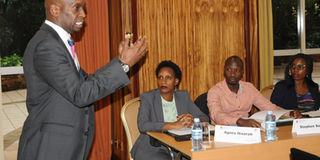Graduates challenged to take up CEO roles

Mr Alvin Mbugua, Uganda Breweries managing director gives a presentation on why smart CEOs falter during the fourth Module of the CEO Apprenticeship Programme. The programme is aimed at training and mentoring exceptional professionals with the potential to become business leaders in their individual fields. COURTESY PHOTO
A Chief Executive Officer (CEO) is a focused leader who has the ability to constantly guide, direct (or re-direct) and evaluate a company’s direction.
Last Thursday, Ugandans in seniors management level drawn from various organisation graduated the from the CEO Apprenticeship programme (CAP) class of 2019.
The CEO Apprenticeship programme (CAP) prepares local citizens for top management roles in companies as opposed to foreigners.
In the world of business administration, the CEO is the company’s strategist and chief decision maker. This is because they (CEOs) come up with the overall strategy and end goals for the business and delegate these responsibilities throughout their team leaders.
The chief executive officers provide overall direction for companies and organisations. They manage company operations, formulate policies, and ensure company goals are met. They also collaborate with and direct the work of other top executives and typically report to a board of directors.
Role
The CEOs are responsible and accountable for the success or failure of a company. They are also aware of external competitors, and are quick to take advantage of any opportunities that have the potential to accelerate company growth.
However, in today’s changing environment in leadership, the above comes with specific trainings that prepare them to be exceptional CEOs in future. This specific one-year training programme for the aspiring CEOs is being conducted at Strathmore University in Nairobi Kenya under a programme named The CEO Apprenticeship Programme (CAP) for those who are already CEOs or in senior management positions.
Positioning matters
Experts argue that a university degree and many years of experience is typically not enough to qualify for most executive positions. Choosing what avenue one wants to work in (for example: finance; administration; marketing among other key positions), will help to determine what position one wants to achieve while determining how to get there.
Speaking in an interview with Prosper Magazine Kampala Serena Hotel, the dean of Strathmore University Business School, Dr George N. Njenga, said in the current economic environment, it is very important for CEOs to have leadership development/continuous professional development through training individuals who would like to become chief executives.
“Uganda and other African countries need to develop the capacity of the citizens through training to have well-equipped local CEOs not those of foreign origin. We need to see the number of local CEOs increasing in African countries,” he said.
Njenga added: “This training programme has had a big impact in the Eastern African region and beyond. We now have 52 CEOs in big companies that have undergone this leadership mentoring programme which has four modules that prepare the business to gain new skills in management.”
As a result of the training, rhere has been a rise in the spirit of leadership and integrity among participants. They are now knowledgeable and courageous enough to face leadership challenges that could come their way in the organisations they are leading.
Dr Njenga explained that great schools like the Harvard University Business School supports and builds both the local capacity of the Americans and citizens from countries around the world to equip them with management skills and strengthen their business management.
Speaking earlier at the graduation ceremony, Dr Njenga said beginning next year, they will be expanding the programme to other African countries.
He advised those who were graduating to use their new skills to transform their companies.
Skills
Other argues that one of the most important skills a CEO needs to possess is the ability to focus and maintain a clear vision of where the company is headed. This vision can sometimes be five, 10, or even 20 years out.
CEOs formulate and establish strategic plans along with performance benchmarks (often with some advice and guidance from the board of directors or advisors) in order to give the company a specific direction.
The managing director of dfcu bank, Mr Mathias Katamba, said the CEOs must demonstrate great leadership qualities and have the ability to garner employee respect so that a positive company culture and atmosphere is created.
“You have to discover your talents and shortfalls. Learn how to improve on the shortfalls and have courage in what you are doing. Courage enables you to stay the course,” he said.”
In every organisation/company, a CEO’s senior management team targets and implements the strategy for their sector. They then report back to the CEOs. In this regard, Mr Katamba said: “CEOs need to have people around them who challenges them. So you need to be beyond the ordinary.”
The CEOs work to generate profits and return value to shareholders. But the best-run companies do more. They put the customer first and invest in their employees and communities.
One of the Trustees of the CEO Summit Uganda, Dr Robin Kibuka said, “You need to build, expand your networks and leverage on your skills,” he said.




